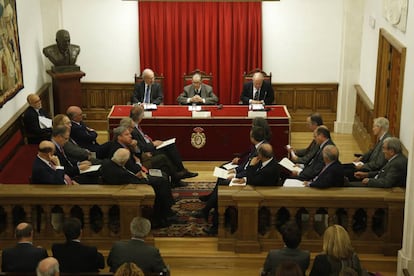Germany, Austria provide inspiration for Spanish Constitution reform plan
Faced with political paralysis, a group of jurists has produced a blueprint to help resolve the Catalan crisis

Around a dozen Spanish university professors of constitutional and administrative law are proposing an overhaul of the 1978 Constitution that would use Germany and Austria as role models for some of the reforms.
This initiative is a result of the group’s perception that political parties are “paralyzed or unable” to undertake the constitutional reform necessary in order to address territorial issues and put the situation in Catalonia back on track. This lack of political action is “endangering the political system itself,” they warn.
This initiative is a result of the group’s perception that political parties are “paralyzed or unable” to undertake necessary constitutional reform
This group of experts is working on its own initiative under the coordination of Santiago Muñoz Machado, a law professor and member of the Royal Spanish Academy who has been a prominent reformer of Spanish public law.
Their actions are a result of the Catalan secessionist crisis and the underlying issue of how Spain’s regions relate to Madrid within a highly decentralized system based on comunidades autónomas, or autonomous regions, with significant devolved powers.
The priority now, say these jurists, is to “build a solid territorial model that will be harder to de-legitimize.”
The group underscores that dialogue is required for this kind of reform, and that the central government in Madrid should be at the helm of a process “to seek a new framework for self-government to be put to a referendum both in Catalonia and in Spain as a whole.”
Their proposal involves updating Spain’s territorial structure by applying “federalism techniques” currently in place in some other European countries. The idea is to reorganize the Senate using Germany or Austria as role models.
The priority is to “build a solid territorial model that will be harder to de-legitimize”
The preferred model is the German Bundesrat, whose members are designated by the Länder, i.e. the country’s states. Another suggested model is that of Austria, where regional parliaments name the representatives of the upper chamber.
These experts also advocate greater clarity about the central government’s powers. The lack of specific instructions regarding where Madrid’s prerogatives end and the regions’ begin on certain issues has resulted in years of conflicts, with the Constitutional Court as the ultimate arbiter. But this tribunal’s decisions have been widely questioned in Catalonia, and accused of a pro-Madrid bias by separatists.
Jurists also suggest changing the legal status of regional charters, known as Statutes, so that these will no longer need to be approved by the central parliament. According to these criteria, Statutes would only require passage by regional parliaments. A row over the Constitutional Court’s response to reforms to the Catalan Statute in 2010 is being partly blamed for a rise in anti-Madrid sentiment in Catalonia.
These ideas are the result of four months of brainstorming that produced a document titled Ideas para una reforma de la Constitución (Ideas for Reforming the Constitution), presented on Monday at the Royal Academy of Moral and Political Sciences, and of which Santiago Muñoz Machado is also a member.
The preferred model is the German Bundesrat, whose members are designated by the ‘Länder’
The study notes that some of its members support adding a new provision to the Constitution, establishing a “singular legal system” for Catalonia and a “bilateral relation” with the Spanish state, as long as other regions agree and only on issues that do not affect Spain as a whole.
The panel of experts also defends the need to incorporate a “European clause” to the Constitution to reflect the fact that Spanish laws are compatible with EU legislation. Other suggested reforms include equal rights to the Spanish throne for male and female heirs alike, and recognizing certain social rights.
Five members of the group – Eliseo Aja, Francesc de Carreras, Enric Fossas, Victor Ferreres and Joaquín Tornos – work at Catalan universities. The others are tenured in Andalusia – Ana Carmona at Seville University and José Antonio Montilla at Granada University – as well as the Basque Country (Alberto López Basaguren) and Madrid (Javier García Roca of Complutense University).
English version by Susana Urra.
Tu suscripción se está usando en otro dispositivo
¿Quieres añadir otro usuario a tu suscripción?
Si continúas leyendo en este dispositivo, no se podrá leer en el otro.
FlechaTu suscripción se está usando en otro dispositivo y solo puedes acceder a EL PAÍS desde un dispositivo a la vez.
Si quieres compartir tu cuenta, cambia tu suscripción a la modalidad Premium, así podrás añadir otro usuario. Cada uno accederá con su propia cuenta de email, lo que os permitirá personalizar vuestra experiencia en EL PAÍS.
¿Tienes una suscripción de empresa? Accede aquí para contratar más cuentas.
En el caso de no saber quién está usando tu cuenta, te recomendamos cambiar tu contraseña aquí.
Si decides continuar compartiendo tu cuenta, este mensaje se mostrará en tu dispositivo y en el de la otra persona que está usando tu cuenta de forma indefinida, afectando a tu experiencia de lectura. Puedes consultar aquí los términos y condiciones de la suscripción digital.








































